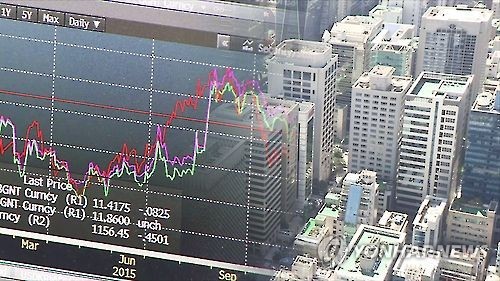Major South Korean companies listed on the local stock market have gone through a sea change in their market capitalization rankings over the past two decades amid the rise of large exporters and fall of several banks, data showed Wednesday.
The Korea Exchange released the list of the top 50 firms as of January 1997 before the country was battered by an Asiawide financial crisis, often called the IMF crisis here for a massive bailout from the global institution.
 |
A composite photo of South Korea's share prices and office buildings (Yonhap) |
Among those, only seven are on the current list.
They are Samsung Electronics, Kookmin Bank (currently KB Kookmin), Hyundai Motor, Samsung Fire & Marine Insurance, Samsung C&T, LG Chem and Hana Bank (Hana Financial Group).
The other ones have been forced off the list, perished through M&As or collapsed.
Choheung Bank, which ranked 12th in 1997, and six other banks on the top 50 list no longer exist on the Seoul bourse.
Korea Electric Power Corp., which boasted the largest market cap 20 years ago, was dethroned and it now ranks fifth. POSCO also fell from third to ninth.
Many of the traditional heavyweights were displaced mainly by tech giants, automobile makers, chemical firms and oil refiners, such as Samsung Electronics, Hyundai Mobis, Kia Motors, LG Chem, SK Innovation and Hyundai Heavy Industries.
They are the key players in South Korea's export-driven economy.
Market leader Samsung Electronics has moved up just one notch in two decades, but its market cap has swollen to more than 250 trillion won ($216 billion) from around 4 trillion won.
Hyundai Motor jumped from 23rd to third in the market cap ranking. Its market cap increased from 800 billion won to 33 trillion won as the share price soared from 20,000 won to 150,000 won.
Two Internet service firms -- Naver and Kakao -- and NC Soft, an online game developer, also joined the new list amid the rapid growth of the nation's information technology industry, along with cosmetics makers AmorePacific and LG Household & Health Care, boosted by the popularity of South Korea's pop culture abroad. (Yonhap)







![[Today’s K-pop] Blackpink’s Jennie, Lisa invited to Coachella as solo acts](http://res.heraldm.com/phpwas/restmb_idxmake.php?idx=644&simg=/content/image/2024/11/21/20241121050099_0.jpg)
